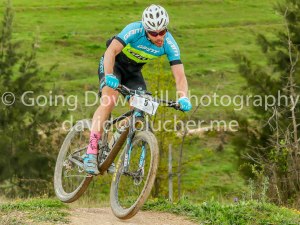Well, what about it?
Hmm, there’s been a constant stream of traffic onto this blog since the Scott, obviously waiting for a diabtribe. But, I really don’t know where to start with this report. In any case, I should reward my fan for their patience.
But I guess the main thing is that I want to shine the spotlight on two other performances over the weekend at the Scott 24 that far outweighed my own in terms of achievement and tenacity. I suppose coming within 40s of picking off 3rd outright after never really being in the hunt makes my result obviously fairly decent, but it still doesn’t fill me with the same level of excitement as the others:
Eddie Baby (Don McEdald for those who don’t know him) took out his first ever solo 24, finally pipping the previously impervious Jason English after the umpteenth time and earning himself some green and gold stripes.
Dugie, my older brother, in his first ever (and quite probably only ever) solo 24 stormed through 370km, doing 30 laps to take 7th outright and 2nd in his age category. I told him pre race I thought he could out this result but man did he ever exceed my expectations.
So Eddie finally got his stripes
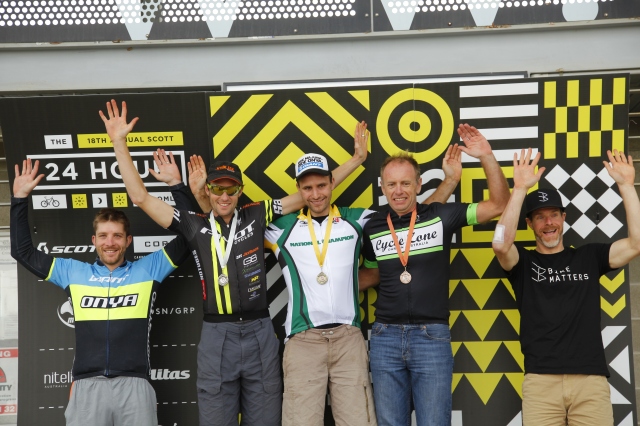
I was inspired to have a crack at solo 24s after the 2012 edition, which was a horrible muddy affair, where the night was miserable and some team mates piked. I thought it was incredible that some guys could ride through the night and still rip off spectacular lap times that most of us punters couldn’t come near, despite having only done a handful ourselves. It was around this time I heard about this ‘Jason English’ guy, who happened to be the brother of one of our pastors at church. Many times Aussie solo 24 hour and also many times world 24 solo champ to boot. Basically inhuman, so obviously my first solo racing hero.
I can’t remember when I first heard of Ed, but it would have been some time in early 2013. The main reason I suspect was because he was the only person who could get close to Jason. In fact Ed won the first ever mountain bike race I competed in on my own – the AMB 100 miler at Stromlo in Feb 2013, beating Jason. This was my first foray in racing, so I started with the hardest thing I could find, survived, and the rest is history carved in a soap cake for longevity.
Then, at the Easter solos I’d obviously figured out who Ed was. I would still say that I was cheering for Jason, but I found it pretty exciting to see Ed taking it to him that race. I think I would have been lapped a dozen times (actually, checking the official results suggests it was only 9 times) and it was cool to be able to cheer on the race leaders – or even more amazingly have them encourage me too. What a world we live in where elite riders will deign to speak to mere mortals and gumbies to boot.
With heroes like these
I think I probably knew ‘about’ Ed, as much as anything from working with Tricky, who’d roped my into MTBing and knew a few of the cool kids around school. So, somehow or other, during the course of 2013 Ed’s presence as a favourite for WEMBO obviously did enter my mind and I was keen to see if he could take it to Jason. When the race unfolded and Ed took off for 8hrs then went home to bed before coming back for a little play Sunday morning I was subsequently disappointed when I heard the story of his illness and how it out the kybosh on any plans for World Domination.
By the summer of 2014 we had managed to form some sort of acquaintance, even to the point where Cal Mac and I raced the Duo Classic together and Ed fed his hand to his front wheel in the start line before chasing us down and generally having a great time.
Through 2014 and 2015 with my loitering around 7hr events plus doing a couple more 24s I got the chance to stand a bit closer to the pedestal and it was all very exciting really.
Probably the most interesting moment was when I actually got 2nd at the 2014 JB 24 at Mt Annan, which served as the Nationals that year. Ed had some issues in the race and didn’t quite make it through the whole thing and I remembered being more disappointed by that than I was excited for my own race result.
Similarly at last years Scott Ed stormed back to grab 2nd from a badly honking Tobias which showed just how much grit he had – and given it was less than a week after WEMBO in Weaverville in the States, were were left wondering just was it possible to beat Jason. I’d picked Tobias to do it actually, but it turned out I was wrong.
At WEMBO earlier this year at Rotorua the seemingly ever present pre-24 illness reared its head again and since outright Elite aspirations were out the window it was back the glory days on the SS. Also, since Brett had falling victim to a skippy it was a fitting tribute as well.
Which brings us to around about now. On the facetubes I’d make the claim that 1st and 2nd in the blokes were done all bar the shouting and it was down to Jason and Ed with the rest being anyone’s guess. My assertion it wasn’t going to be much of a race was also a sly poke of the bear to see if Jess Douglas would take it (the comment) seriously, but I didn’t get much of a bite.
Leading into the race Jason had been having a hair racing adventure in India while Ed was just ticking along and staying off Strava. What would prove to be the ideal lead-in to a massive race? Would Jason’s legendary training and time at altitude help or hinder?
Best pit crew evar! (Gonna claim it cause it wasn’t even me)
Doug had actually pitted for Ed his last 2 times out, at the Scott and WEMBO. Ed had actually said that the 2015 Scott was actually the best he’d ever eaten at a 24 and it obviously showed by his consistency into the morning. He’d been similarly consistent at WEMBO too, but just not as strong as the mad Pom on the day.
What with Doug racing and all it was back to Ed roping on his mates again, which was helpful as their mad Skillz were put to use on mine and Dugies bikes as well.
So, some racing or something.
The beauty of a solos only start to a 24 is that no one at all on the start line has anything significant to be gained from first lap shenanigans, besides a bit of sledging on the crit track and up the first fire road climb.
I don’t know if Ed or Brett was referred to as ‘Contador’, but it was funny either way.
The first lap was pretty sedate really. I’d asked Ed if he was going to go for the stupid attack to try and put Jason under pressure early, but with no Tobias or Canadian lumberjacks (who are OK and have no obvious cross dressing predeliction) it seemed neither was going to go out hard.
I was being deliberately cautious myself. After some hard days on the SS due to the wet and then finally getting to the HoP my hammies were tight as anything and I fully expected an early and spectacular implosion. While making sure I didn’t plod along getting bored I deliberately made sure to NOT try and bridge the 10-15m gap to Ed and Jason on the climb. I was pretty happy with the pace in that it was reasonably high but not going crazy into the red zone, so pretty enjoyable.
When the gap formed it was just me with Maxie and Chris. Jason and Ed looked to be having a friendly chat but the 3 of us weren’t very talkative. I didn’t really have clue as to what to say actually, which was the main reason for not chatting. I did tell Max to not attack but had to ask Chris who he was. Being from Darwin meant I hadn’t seen him around and I hadn’t paid enough notice to last years results to know he was a serious competitor in the long run. The chat didn’t get much of a chance to continue though, as I had some issues with my rear tyre coming down the end of skyline into luge. I realised I didn’t even have a CO2 nozzle and therefore wasn’t going to get any air into the thing. Since it turned out to be a dodgy valve that wasn’t sealing properly I was able to limp it back in behind the Bellchambers group. I had a giggle coming down Breakout when Brett finally had to let those with gears and a fork through and stop holding them up. Luckily I only lost a few minutes.
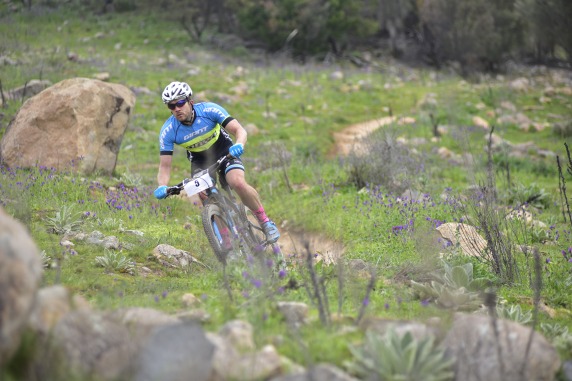
So, I was now a bit out of sync with the guys I was probably racing against, but I figured it wasn’t worth trying to get that time back, at least not in the short term. As per usual pre race when asked how I felt I replied that it didn’t matter. I knew my back was going to cause problems but I wanted to hold off the drugs as much as possible. So thus began the process of ticking off laps, eating and drinking, waiting until dinner time and to be lapped by the leaders. I was secretly wondering who I would see first: Dugie or Ed/Jason. I was thinking Dugie at about 4hrs or so…
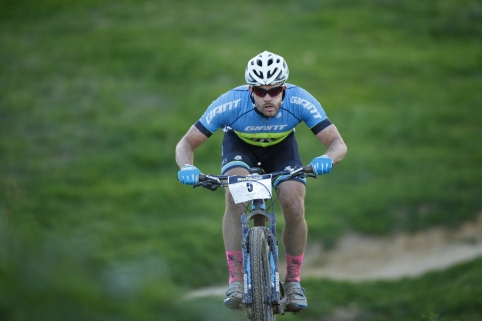
I first got lapped by Ed at 9:30 or so in the evening. This was in fact a record hold off from the leaders for me. Last year it’d taken only till about 7-7:30. Ed was on his lonesome and I was at first surprised he was out in front. But then after some excitement and encouragement I was told Jason was ‘not far behind’. Ed got me on the climb and I expected to see Jason not long after, but I rolled into transition, then had to faff around with my lights a bit and assumed I missed the lapping, as I never saw him at all.
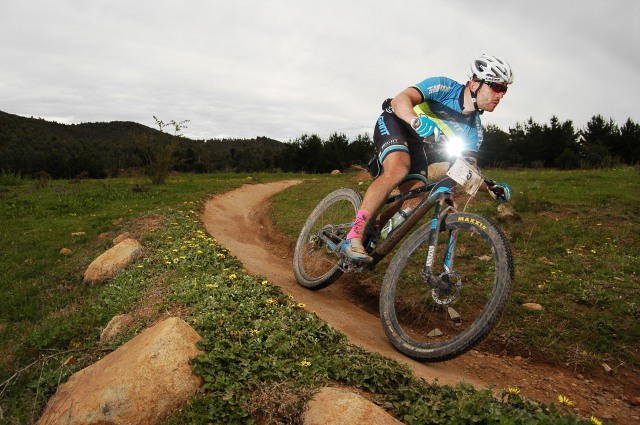
Meanwhile: Dugie is a machine
In my WEMBO write up I used Doug as an example of someone who could smash out a solo 24 race, even without specific training for it or anything else. This would be achievable mainly through ticker and having some legs (you’ve got to have at least some). I dunno when Dugie decided he was going to enter the Scott. After having him in my pit for my first ever solo and a couple of times since, plus as I mentioned earlier he went over to Rotorua to pit for Ed earlier this year, so he obviously had some idea of the kind of pain he was probably going to be in for. I was kinda surprised he intended to enter, as I specifically didn’t challenge him to do a 24 in my write up. But anyway maybe he still saw it as one as I’d used him as a specific example.
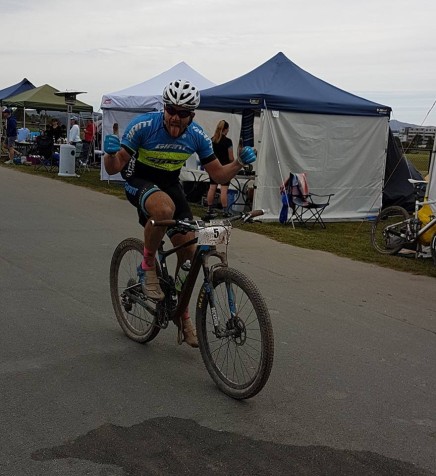
He was definitely nervous. While you can say it’s probably harder to be in the pits, I’m not entirely convinced, as much as I value the great efforts, particularly of Sonja in the my last few races. But in the end I barely saw him all race. While I’d expected I might see him around the 4 hour mark, but as time ticked on it seemed I had greatly underestimated him. When I lapped Brett Bellchambers for the first time he said Dugie was up in front smashing it out. I was pretty stoked but surprised at the same time. Apparently I did pass him on track but don’t remember it. He claimed I said he was doing awesome and some other random and generic words of encouragement. I asked him at the end if I actually used his name. He didn’t think I did so I said it was likely I was doling out generic encouragement – even though I was looking out for him. A bit of lap analysis and strava flybying showed that I passed him in the pits when he had his flat at about 8am, so we pretty much kept the same schedule all race.
The only time I saw him that I remembered was at around 4am when he was in the pits have a quick break when I came in. It appeared he wasn’t enjoying Slant 6 much. I would agree that that trail was the one that was holding up the worst due to the growing mud, but it was hilarious to catch his loud outburst about its condition, apparently aimed at Kris Nicholls and hopeful we’d get a complete firetrail bypass. I actually wanted the 6+6 riders to have to endure it in the morning.
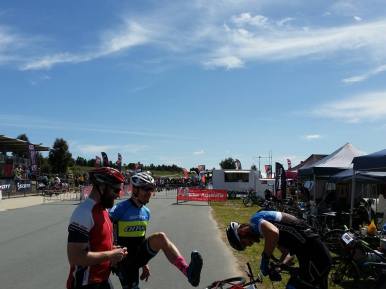
So, he clocked up a 370 odd km in his first ever solo race. He said afterwards he never felt like quitting, never had any deep struggles. I had warned him beforehand that wanting to quit was a pretty normal feeling. I myself desperately wanted to stop and go to sleep at about midnight. Both Ed and I were rightly chuffed and immensely proud of his achievement. I think the numpty doesn’t quite realise how amazing his effort was his first time out. I only got a couple more laps in than him, and I’m something of an old hand at this game now. I suspect that the complete lack of expectation really did help him out. If he put any pressure on himself he may have found it different, but freedom is great.
Back to Eddie smashing it out off the front
The next time I saw Ed was about 2:30 in the morning. He was on his own again and still smashing it. Still in the zone. Still. I had last seen Chris at midnight as he easily rode away from me after recovering from his flats, while I was just feeling flat as a tack. I was surprised to have survived that long without a major back explosion or similar disaster, but had starting sucking down as many caffeinated things as I could procure as well as some bbq sausage sangas.
Every subsequent lap I came through transition I was still in disbelief and unsure if I’d just missed it. My own pits weren’t the smoothest, but as usual Sonja was doing a better job of organising me than I was of being organised. Doug has said that Ed is much easier to pit for, because he just does whatever he’s told whereas I’m fussy and picky and generally a pain.
Eventually Jase rolled onto my wheel at around 5:30. The strangest thing at this point was that he wasn’t racing to go past me, which I had sort of assumed he would’ve at that stage. This was the first 24 since I’ve been involved (and really in 25 races) where Jason was not only not leading going into the last quarter, but was also down a significant margin. At WEMBO at Rotorua earlier this year Jason and Cory Wallace fought hammer and tongs together until the very end. This time around Ed was putting time into Jason with dare I say it, a Jasonesque performance. Last year at the Scott, having been force fed by my brother Doug who was pitting for him, Ed had one of his best race finishes ever, reeling off quick lap after quick lap throughout the morning to eventually jump Tobias (who we – or at least I – thought would be the one to take Jasons mantle) for a fantastic 2nd.
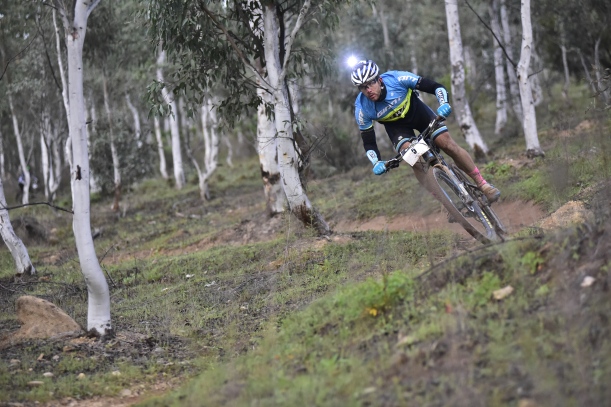
Jason was actually surprised it was such a long time since I’d seen Ed. It was in fact so far in the past that I couldn’t actually remember exactly when it was. The night laps of a solo 24 are always something or a blur but I did know it was longer than I had expected, but I was cheering for Eddie so hard I was pretty stoked and excited by it all the same.
Jason and I chatted about how our respective races were going. Jase was lamenting his lack of top end, having seemingly burned it all away in India – a place you apparently don’t visit for the bike riding, but just for the experience in general. The Himalaya challenge was about as loose and crazy and dangerous as anything you’d just want to survive. I suspect it was type 2 (or maybe just 1.5) fun a lot of the time. I had the obvious complaint that I couldn’t actually push and just had to spin. Saving the legs for the sake of the back basically. Both of us were thinking of mere survival to the end, though I did ask Jason if he was planning on ripping it up in the morning as per usual. He was planning on trying but didn’t seem too hopeful. In fact he seemed even more pessimistic than last years Scott or a WEMBO, when we had conversations where he claimed to be suffering and getting smacked up by whoever, or just being tired – but still ended up pulling a win out of the bag.
So much for staying consistent
One thing about being lapped by the leaders, is the optimism that this will subsequently happen at the same intervals later in the race. So it was 9:30pm for the first, then 2:30am for the second. The third was around the 7-8am mark or something and then the final time was at about 11:30. As per usual the race leader was firing on all cylinders and keep lap times both low and consistent. Despite the obvious disappointment that I was getting lapped subsequently quicker each time, my excitement was growing and my cheering more manic. I still had a voice, but not quite enough to get the high enough pitch for a “yeow” when he went past the 2nd last time.
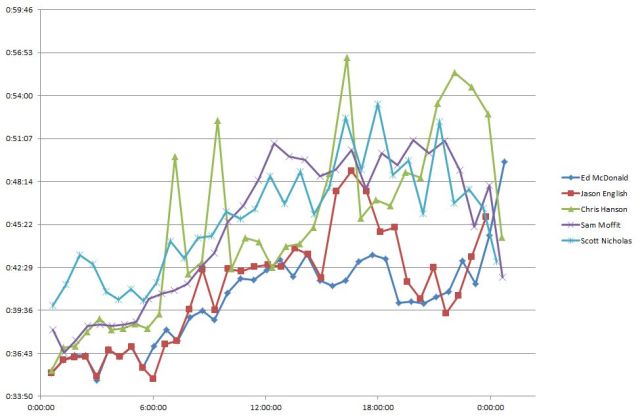
The final time I saw Ed was up Red Rock lookout, just near the big rocky A line I can’t ride and usually fall off on. I only saw about 4 6+6 riders (all of whom are properly elite) take that line while the rest of us strugglers went around the long way around. To be fair it’s not a huge saving in time versus the effort involved, compared to a few of the other lines on the climb. Ed was with Seb Dunne this time around, enjoying a lap that would put him in the unassailable lead. I was feeling a little bit more smashed at this time, as I’d just had a little bit of a go the lap before and was not taking it completely easy this time around – all to ensure I got my last lap (number 33) in. I managed to hang onto them for most of the descent before they took off up the last fire road climb. Since I was going out again, Ed was planning on waiting in the pits for me to arrive, then the 3 of us would venture off for one last glory lap.
Not what I was planning at all
After 23 hours and 50 minutes my plans took a nasty turn and I got a very rude shock. After not pushing a pedal in anger for pretty much the entire race (I’d been thinking up Strava ride titles to this effect as a mental exercise throughout the race) for the finale I had to push a little bit more. In fact a lot more than I was comfortable with, but that’s the way it goes. Rolling into to grab my bottle for the last lap I got the confusing, factually incorrect and potentially misleading advice/race update:
“You’re in 3rd”
What?
You must have passed him that lap, we haven’t seen him come through yet….
Now, I was pretty sure I might have noticed Chris if I’d caught him up. Not that I could actually remember his kit, but it probably would’ve come up in conversation. I suspect I’d have asked him how his race was going and then by process of deduction we would have figured out we were racing against each other for outright honours and sheep stations and then panic stations would have set in.
Still, I reasoned thusly, that if I had indeed just passed Chris he wouldn’t be far behind. Certainly about as close as a flat tyre or just a slow lap to put him back into 3rd. So, with no better information available at that time (since Sonja hadn’t been following the timing much as I wasn’t ‘racing’ per se) I had to make do with what I had. Looking at the graph below you can see the gap had blown out to about 26 minutes at 9:30 in the morning. Certainly to the point where any sense of urgency or even really excitement had seeped away.
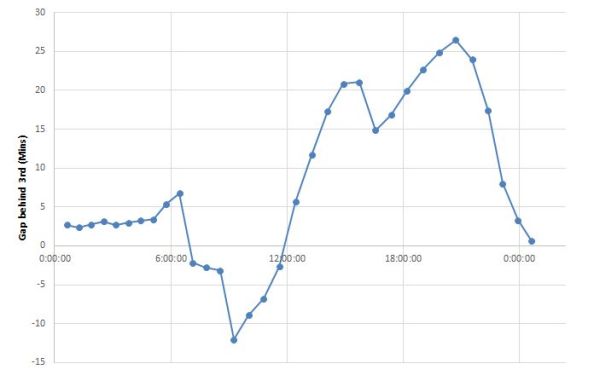
With the fire abruptly lit I ended up blasting past Ed in the pits, then saw Jason waiting at the top of the fenceline fire trail with his dad while debating finishing one last lap. He was obviously waiting to see if Ed went out again or something and in the end finished up without going up the hill one more time since he didn’t need to. I didn’t have time for pleasantries and by the time I hit the base of Cockatoo switchbacks and started boating the river Ed was only just in view near the playground and that was the last I got to see of him. I actually thought he wasn’t going to finish the last lap, but since he was on, he finished like a boss. He cracked the 450ks and even broke his Strava blockout too for such an awesome ride. Sonja had warned him that he might want to get a little head start out of the pits and then let me catch him up, but I don’t think either of us had any idea of the flogging I was about to endure and that Ed wasn’t going to want to have to try and make up the gap!
In the end I nearly caught Chris and crossed the line all of 37s after him. But in the aftermath I wasn’t disappointed or upset or anything like that at all. Frankly when I’d last seen him at midnight I was pretty sure he deserved 3rd as he was smashing it while I was in 2620 (a joke that only Canberrans will understand and some from nearby might feel offended by). That it came down to such a close margin after a day of racing is pretty crazy. I wonder how it would’ve been if I’d actually caught him up and we had to sprint for the finish. It could’ve been interesting, according to one of my other mates who used to ride with him in Darwin he used to do road bunches on his mountain bike and outsprint him.
About time too
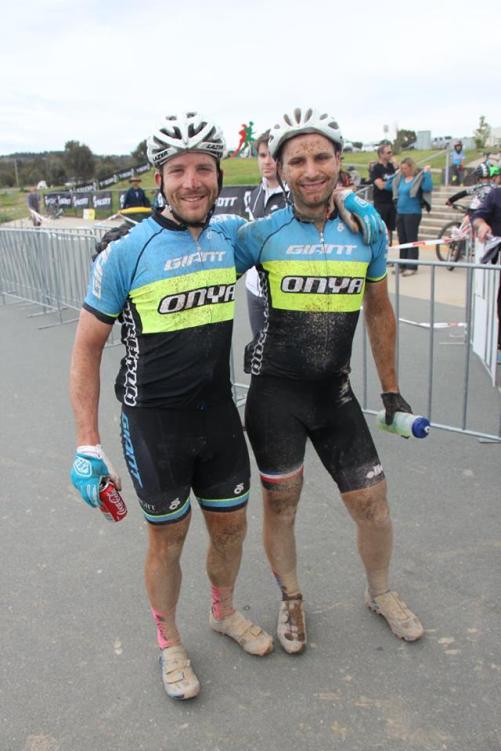
Post race Ed said the result hadn’t sunk in. I’m not surprised. This was actually the first 24 he’s won outright. Every single other solo 24 he’s entered in he’s finished behind a certain Mr English. The reality of finally climbing the mountain is definitely likely to be surreal.
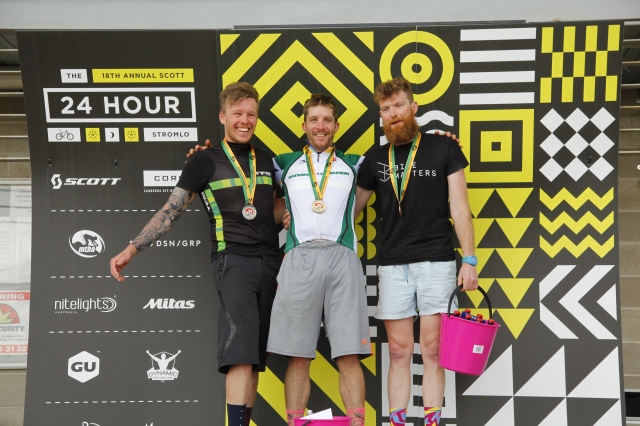
I was pretty excited to get to share the podium with the boys. Ed was even wearing my Onya hat too!
Only one thing now remains and that’s to get himself some proper custom Aussie champ Onya kit and maybe rock it at WEMBO at Finale Ligure in 2017. The bugger better not retire just yet either. I’m not fast enough to deserve outright stripes.


